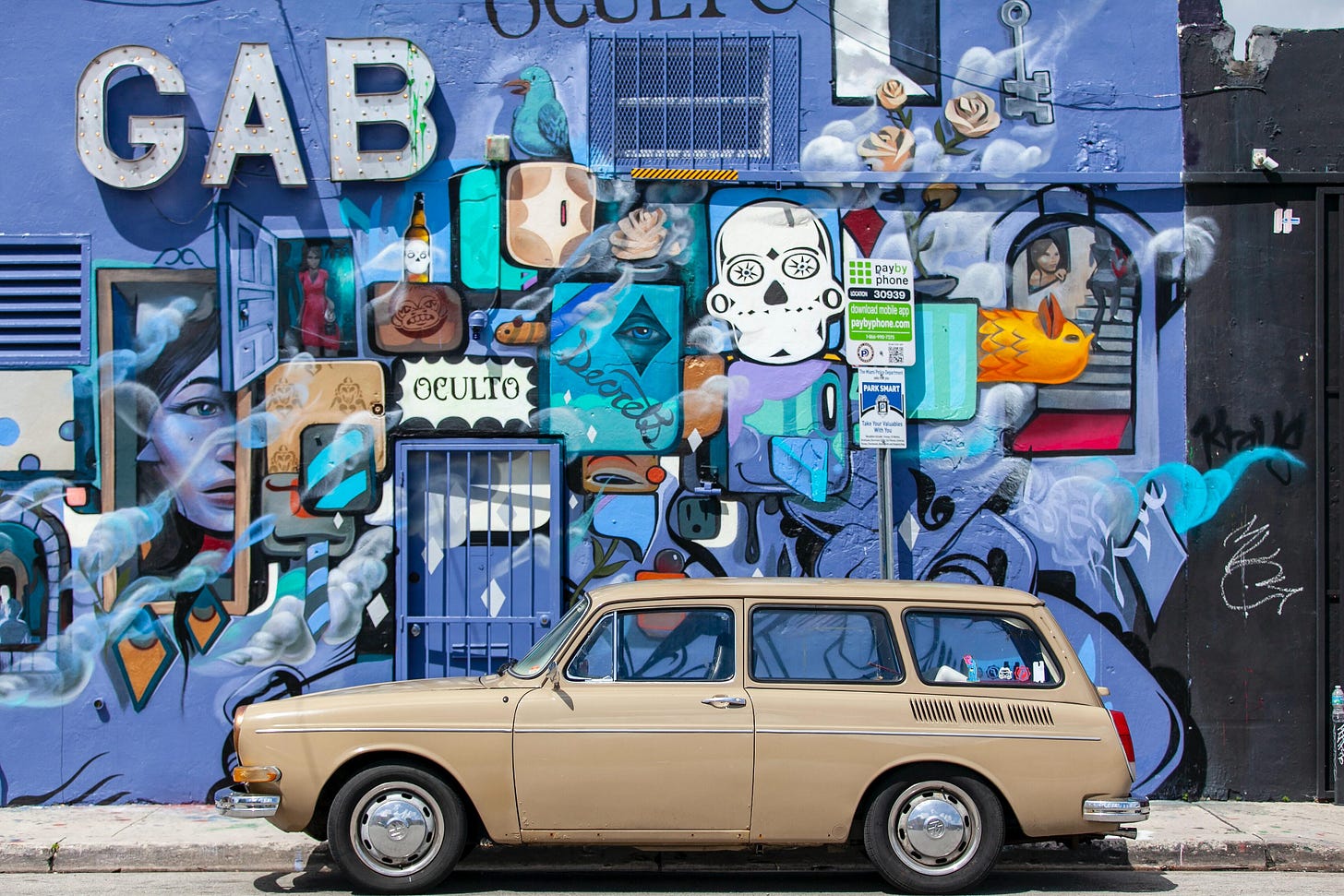The Wheels on the Minivan Go Round & Round
Did a friend forward this to you? Subscribe here!

Spaceship Surveillance

Photo by Алексей Васильев
In high school, I drove an ancient Volvo with no A.C. and windows that had to be hand cranked. The radio didn’t work so I drove around with a battery-operated boom box. My next car, a 2003 Toyota RAV4, had all kinds of exciting features—automatic windows and locks, a CD player (and a tape deck!), and a sunroof (which eventually led to the car’s demise.) As exciting as all these features were, they eventually stopped working (and caused other problems, like the sunroof leading to leaks which led to mold). The car’s complicated computer meant that my father couldn’t easily fix any problem, as he had always done on all our family cars.
When we moved to Puerto Rico a few years ago, I insisted that we buy a used Toyota RAV4; we found one from 1999, with window cranks! The radio worked and the AC puttered—the bare minimum. Beyond that, it got us from point A to point B, and that was all we needed.
When we moved back to the mainland, Norbert and I needed to buy a car. At Norbert’s insistence, we bought a brand-new minivan. It was a shock to my system; my father had always taught me that a new car loses value as soon as you drive it off the lot. Regardless, these are crazy times where a global pandemic has caused supply chain issues and new cars are hard to come by and used cars are just as expensive as something new and, well, these are crazy times.
Car shopping with Norbert was an emotional—and often hilarious—experience. We sit on complete opposite sides of the technology spectrum. When we were test-driving the minivan, the car salesman kept pointing out the various gadgets and fancy features. I had to stop myself from rolling my eyes, completely unmoved by the millions of sensors and buttons for everything. I was aghast when the salesman told me to let go of the steering wheel in a turn and take my foot off the pedals as we neared a stoplight. “Why would I do that!?” I shouted. Meanwhile, Norbert was completely smitten.
Eventually, Norbert won out. I’ve nicknamed our minivan “The Spaceship” for its futuristic self-driving capacities. I use it to get from point A to point B and, while I do appreciate some if those crazy gadgets, I’m sure I’m not using the car at its full capability when it comes to all the things it can do.
Our spaceship started making a strange sound last week. Neither Angela, our au pair, nor I had any idea of what may have caused the strange sound. Angela said she remembered hearing the sound on Wednesday when she had gone to play basketball.
The car also has an app, which I vaguely knew about because sometimes Norbert is able to lock the car from his phone. If you’ve been reading this newsletter for a while, you know I’m not the first person to get onboard the technology train. I knew there was something about an app for the car, but I personally wasn’t interested in learning more about it. When the car started making the strange sound, Norbert went to the app to find out if maybe the app knew something we didn’t about the car. Maybe the app had recorded an accident of some kind, some trauma that had happened to the car which had resulted in this strange noise.
As it turns out, the app did know something that we didn’t. “Apparently the car went to Raleigh last Wednesday,” Norbert said, showing me something on his phone. It was the image of a map and it clearly showed the day and time when the car had traveled 50 miles to Raleigh and back.
“Wait,” I said. “What is this? The car has a tracking device?”
Of course. I should have known that the car has a tracking device. It’s the year 2022.
This posed a bit of a dilemma for me. While Norbert is always sharing his live location with me from his phone, I disable any features that track my movements—in the real world and also online. We’d caught Angela in a white lie, which made me uncomfortable. But I was also uncomfortable knowing that the car had been recording our movements unbeknownst me (and to her) ever since we’d purchased it. It’s not that I have anything to hide. It’s more about the fact that I inherited a general distrust of Big Brother from my father. An extremely resourceful but also slightly paranoid individual, my father’s favorite quote was: Quis custodiet ipsos custodes. Who will guard the guards themselves?
This discovery was a reminder of the many ways that our information is being tracked and shared in ways that we don’t always know or understand. We have all these systems set up for the sake of convenience, but we rarely think about what we’re giving up in order to have those conveniences. We often talk about loss of privacy, and here’s a perfect example.
I think back to my high school days when I drove that sturdy but ancient Volvo around Miami. How many times did I tell my parents I was going one place but actually drove elsewhere? I had a freedom back then that barely exists today. I think about our two boys, who will likely be driving this minivan around when they get their licenses one day. They will have grown up in a world that surveilles them constantly. It will seem normal to them. And yet, it’s not.
If you enjoy this newsletter, please
I also accept monetary support via Venmo, Zelle or Paypal!
Thanks for reading!




